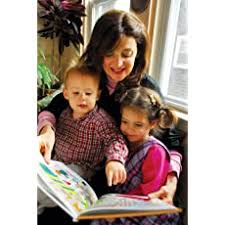
Bracha Goetz graduated from Harvard University, attended the Medical College of Virginia, and studied at Ohr Somayach Women’s Division in Jerusalem. Having lived for a time in Israel, she currently lives in Baltimore with her husband. All of her children are married, with children of their own. With her youngest daughter and family living in Israel, Bracha and her husband hope to return to Israel soon.
Author of no less than 38 children’s books, Bracha is also an editor of books for women, a frequently published poet, the author of her recent memoir, Searching for God in the Garbage, and an international speaker.
Q: How did you get started writing children’s books?
I wanted to write the children’s books that I couldn’t get when I was a child. I wasn’t brought up observant and I wanted books that spoke about the soul and books that would nourish a child’s soul. I started writing my first book when my children were little. I lived on a yishuv in Eretz Yisrael and I was newly observant. I would sit outside and write, although I didn’t have a typewriter, a word processor, or a computer. I put my handwritten manuscript into an envelope and sent it to the United States. A publisher wrote me back a few weeks later that my book was accepted! Wow – I discovered that is how you write children’s books.
Q: Where do your ideas come from?
They come from what I feel is needed. As my children and my grandchildren were growing up, I would watch them and try to write books that were helpful for them. I wrote books that I felt needed to be in the world. For example, Let’s Stay Safe and Personal Privacy are two safety books on topics that weren’t being written about. The books teach children about personal safety and guarding against abuse. It was a major breakthrough. I write about other things that need to be addressed too. For example, Let’s Appreciate Everyone is about children with disabilities and how to get better at befriending them. I wrote Hashem’s Candy Store to increase healthy eating in our communities.
Q: How are your books different from all the other children’s books?
My books are written to help children grow spiritually and to help children’s souls shine. In the public library, I saw a board book similar to the What Do You See? books that I ended up creating. I was reading the library book to my granddaughter and I thought to myself that there really should be a Jewish book like this. So I decided to write the book and insert important Jewish values that even a toddler could easily grasp. It is important for a Jewish child from the beginning of his or her life to see the world through Jewish eyes.
Q: What advice do you have for writers just starting out?
I always encourage people to write the books that they have within them. Some people have ideas for books in their minds for 20 years. I like to say that it takes 20 years and 20 minutes to write a book. After carrying it around for 20 years, enjoy getting a rough draft of it out in 20 minutes!
Q: How does your spirituality come into play in your writing?
That’s what it’s all about. We are spiritual beings here for a spiritual purpose. All these pleasures of the beautiful, natural world are given to us to uplift our souls. I was a starving soul. My soul was activated by the light of Torah and so I love to share the instructions for living. And when I help other souls to shine, it helps my soul to shine too.
Q: Who is your role model?
Rabbi Noah Weinberg of Aish HaTorah, of blessed memory, and Rebbetzin Denah Weinberg. Rabbi Weinberg taught about the five levels of pleasure in this world: physical, love, meaning, creativity, and transcendence. Many of Rabbi Weinberg’s teachings are based on the writing of the great Kabbalist, Rabbi Moshe Chaim Luzatto, also known as the Ramchal.
Love, according to the wisdom shared by Rabbi Weinberg, is focusing on the virtues of another, which gives us pleasure to do. And the purpose of life is to experience the greatest pleasure possible, as explained in the Ramchal’s The Path of the Just.
Meeting the Weinbergs, and understanding the love they have for all of humanity and their wanting to raise us up to experience the greatest pleasure in life, was awesome. It transformed my life.
Q: What makes you happy?
What makes me happy are all the pleasures in life. Even the pleasures on the lowest level in life are so plentiful – all the physical pleasures for our senses that exist in nature, music, dancing… For example, Hashem could have made food tasteless, having no aroma, and not particularly beautiful to look at. Food could have been just a bland pill we take each day. Instead, Hashem made a vast variety of food, and it is all designed to uplift our souls through the pleasure it provides.
And each level of pleasure we can bring into our lives on our own. Even if we were in prison, we could experience pleasure. This concept is empowering because it informs us that we can bring pleasure into our lives at any moment. That is really why the Almighty created us – to experience the greatest pleasure possible in life since we are the Almighty’s children – just as we want that for our children. Gratitude is what helps us to more fully experience all the pleasures. And the more we exercise our gratitude muscles, the more we are able to utilize them to go through life joyfully.
Bracha Goetz’s books are available at:
